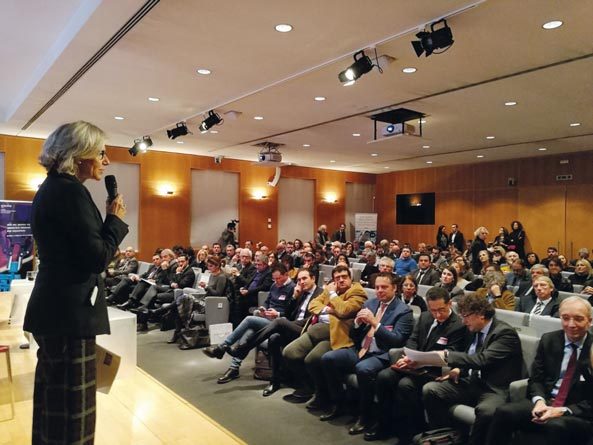Towards Digital Transformation
The 2018 edition of SPS IPC DRIVS Italia is scheduled for the end of May, once again at Fiere di Parma. Last December, with a Press Conference, Messe Frankfurt introduced the highlights of the event which will be focused on digital transformation, innovation and training.
by Silvia Crespi and Fabrizio Dalle Nogare
The Italian “4.0 lab”, as SPS IPC Drives Italia was defined during the press conference preview held last December at Sala Buzzati, Corriere della Sera, Milan, is ready for its new edition. The one that will take place in 2018 – the eighth for Italy – is scheduled from May 22nd to 24th, 2018, in Parma.
Training, digitalization and innovation are the key words of the next edition, which will see, among the most significant innovations, the expansion of the fairground with a path dedicated to Digital Transformation, as well as a new hall, named Digital District (DD), which will host the major players in the Digital, Software and Cyber Security fields. Compared to the previous editions, the range of distributed intelligence solutions, integration with robotics, interconnection and standardization, Big Data, Analytics, IoT, vision and measurement systems, advanced simulation, hardware/software integration has been enhanced.
A 10% growth is expected for the 8th edition
“The capacity of SPS Italia to adapt to technology and market trends at every new edition is quite amazing. Based on the positive trend of the exhibitors’ participation, we may expect a 10% growth this year”, said Donald Wich, Messe Frankfurt Italia CEO, introducing the event.
Fabrizio Scovenna, president of ANIE Automazione, underlined the key role of the event on the Italian industrial scenario, which certainly took advantage of the government’s Industry 4.0 Plan. “SPS Italia has become an extremely relevant event for the Italian automation sector. Our association started several years ago a fruitful collaboration with Messe Frankfurt Italia, which led to the creation of Forum Meccatronica and to the revitalization of Forum Telecontrollo”.
Professor Giambattista Gruosso, Politecnico di Milano, introduced the results of the observatory named “Mapping of Mechatronics Skills in Italy”, this year dedicated to the Marche region. “We have noticed that even the service industry is paying more attention to the issues of automation. This results in a new path to mechatronics, not only in terms of process or machine, but also for the benefit of markets and customers”, said the survey coordinator.
Fare Cultura 4.0: focus on training projects
SPS Italia will be increasingly focused on training, thanks to the involvement of technical schools, universities and start-ups. Besides all this, the event’s partner associations are strongly committed: in addition to ANIE Automation and AIdAM, there are also ASSOFLUID, ASSIOT and ANIMA. All these associations will be present in the Cultura 4.0 area with dedicated projects and information desks.
“Investments in people and knowledge should be carried out in quite positive moments like the current one”, added Domenico Di Monte, president of ASSOFLUID. “We often talk about enabling technologies, but the real enabling factor is the man: we cannot think of a 4.0 department in companies that are not ‘4.0’ or part of a ‘4.0’ supply chain. To achieve all this, knowledge has to be pervasive; as a meeting place for knowledge and skills exchange, SPS is an actual training opportunity”.
Fabrizio Cattaneo, ASSIOT secretary, also emphasized the issue of training, underlining how “the thirst for 4.0 know-how in our sector is quite clear, as proven by the training projects promoted by some major companies. Let’s think of Carraro, Oerlikon Graziano or Bonfiglioli, the latter involved in a vast re-training project for continuous training and the conversion of employees’ skills”.
A White Paper on industrial software
The second part of the morning was dedicated to an interesting round table focused on industrial software in the 4.0 era. Moderated by Marco Vecchio, Secretary of ANIE Automazione, the meeting was an opportunity to present the “Industrial Software 4.0” White Paper (also available online at the Association’s website) on the benefits deriving from the use of advanced software solutions. The paper was prepared by the Industrial Software Working Group of ANIE Automazione, which was specifically set up to deal with these issues and support the cultural growth of companies as for 4.0 matters and the role of industrial software in this context.
In addition to the modernity of this topic (software is the enabling factor of the fourth industrial revolution), the round table aroused interest not only for the several speakers in the panel, but for their heterogeneity: it included members of manufacturing companies, as well as companies in the automation sector and the ICT sector, different subjects that today are called to collaborate ever more closely.
The centrality of industrial software and its “aggregating” role between the world of ICT linked to business processes and the world of corporate operational processes determines that the reference players are decidedly heterogeneous.
As stated by Fabrizio Scovenna, President of ANIE Automation “Today, information systems are the engine for the evolution of manufacturing and the concept of a smart and digitalized factory, summarizes this role. The IT/OT connection, Big Data, Analytics, as well as the concepts of virtualization, validation, simulation, prototyping, artificial intelligence, etc., are all distinctive, essential elements to best implement the digital transformation in industry and not only. The investment in IT infrastructures is increasingly becoming one of the main levers to guarantee manufacturing companies the efficiency and effectiveness necessary for their own survival”.
Industry 4.0 at a software level
Industrial software as a technology enabling factor towards the transformation of Industry 4.0 is included in the Calenda Plan. The ANIE Automazione White Paper aims to define guidelines that companies can follow to implement, in practice, the investments financed by the National Plan. But what does Industry 4.0 mean at a software level? The creation of efficiency in processes is only one of the objectives of the industrial software, which also concerns, in fact, design and research.
Design is rapidly evolving. Sequential design (mechanical, electrical, PLC) is fading away to leave room for a “parallel” design. An example of this is the digital prototype (or digital twin) that allows you to simulate the manufacturing and operation of the machine before its actual implementation, an approach that involves a cultural change of the way of working.
During the round table, the importance of software to make the final product collaborative (products that collaborate with the information system) or, in other words, that software intelligence is inherent in the product has also emerged. But that’s not all, the efficiency of this must then be reflected into efficiency for the end customer.
All the speakers agreed that the increasingly close collaboration between the company management system and the various software in the company is essential. To this end, companies must equip themselves with a platform that, as soon as possible, should also be extended to the outside of the company, to suppliers and customers. The importance of the platform was reiterated several times. All processes must be integrated both horizontally and vertically: from the company management system to the single work island and vice versa.
All of the above is undoubtedly also true for SMEs, contrary to what one might think. SMEs represent a huge potential for industrial software and Italian SMEs, as stated during the round table, would definitely be “ready to jump”, a leap that even the small business owner can now manage by working, however, in a platform perspective.
This, in a nutshell, is what emerged during the discussion, which covered other important topics such as user ability, which is increasingly important, or Cyber Security, another burning issue.
As stated by Fabio Massimo Marchetti, President of WG Software Industriale, in conclusion of the debate, this round table was the first step towards the creation of a forum dedicated to industrial software. The WG is collaborating with some important Italian universities, to define ROI calculation models with reference to specific application areas; in addition to launching all the initiatives necessary to support companies, especially small and medium-sized Italian companies, to understand and use the currently available ROI accelerators (incentives).

